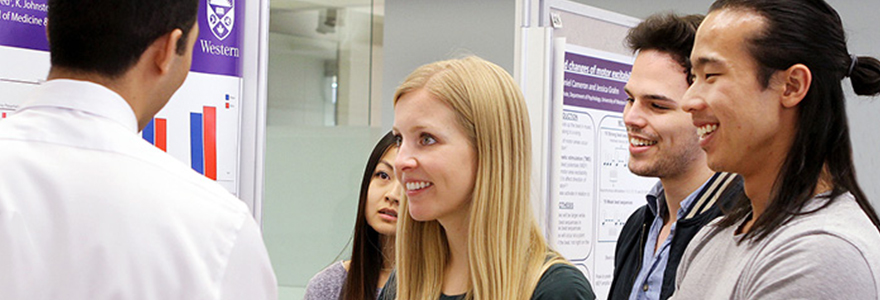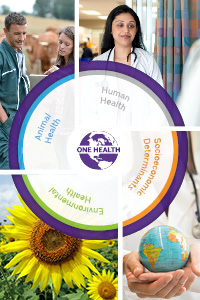Undergraduate
Related Links
- OWL
- Bachelor of Medical Sciences (BMSc)
- Schulich Medicine
- Schulich Dentistry
- Pathology Resources
- Schulich Dentistry
- PathOER
Contact Us
Department of Pathology and Laboratory Medicine
Schulich Medicine & Dentistry,
Western University
London, Ontario
Dental Sciences Building,
Rm. 4044
palm.undergrad.bmsc@uwo.ca
t. 519.661.2030
One Health

What is One Health?

One Health is an integrated effort of multiple disciplines working locally, nationally and globally to attain optimal health for humans, animals and the environment.
The Honours Specialization in One Health, leading to a Bachelor of Medical Sciences (BMSc) degree, was created in collaboration with Western University’s Departments of Sociology and Geography in the Faculty of Social Science to enrich the learning experience of students.
The module offers an innovative, interdisciplinary education and research experience for students, which focuses on the intricate link between animal health, environmental health, socioeconomic factors and human health.
Why is the Honours Specialization in One Health unique?
- It provides access to unparalleled breadth and depth of knowledge in life sciences, physical sciences, social sciences, and the humanities with the focus on attaining optimal human health.
- It offers research projects in the senior year with access to supervisors from various departments and faculties at Western University.
Courses
Priority Information is on BMSc Website: Click Here
One Health 3300A – Foundations in One Health
The history, core concepts and foundational approaches fundamental to this multi-sectoral and collaborative discipline are presented in lectures and in-depth case studies of the three pillars of One Health (human health, animal health and environmental health).
Prerequisite(s): Biology 1001A and Biology 1002B; either Biology 2244A/B or Statistical Sciences 2244A/B; and registration in third or fourth year of a BMSc or BSc degree.
Extra Information: 3 lecture/seminar hours.
Course Weight: 0.50
Term: Fall Term
Wait list option available.
One Health 3600B – One Health in Action
Key research designs and methodologic approaches fundamental to the multi-sectoral and collaborative discipline of One Health are presented in both lectures and in-depth case studies. Topics include study design and methods, data surveillance systems, engaging stakeholders, and implementing the One Health approach into action and policy change.
Prerequisite(s): One Health 3300A/B with a minimum mark of 70%.
Extra Information: 3 lecture/seminar hours.
Course Weight: 0.50
Term: Winter Term
Wait list option available.
One Health 4100G – Human Health, Animal Health and Comparative Pathology
The One Health concept acknowledges the global interdependence of people, animals, and the environment. This course focuses on the animal component of One Health. Areas of exploration will include wildlife, livestock, and companion animals, in addition to the use of animals in research, and comparative human and animal pathology.
Antirequisite(s): the former Medical Sciences 4100F/G.
Prerequisite(s): Enrolment in Year 4 of a module in IMS, Medical Bioinformatics, One Health, or Pathology.
Extra Information: 2 lecture hours.
Course Weight: 0.50
Term: Fall Term
Wait list option available.
One Health 4985E – Thesis Project in One Health
A major research project using a One Health approach which emphasizes study design, data collection and analyses, interpretation of results, and communication of results by written, oral, and poster presentations. Students will select a project from a list provided by the department and be matched to a supervisor.
RESTRICTED TO YR 4 HONOURS SPECIALIZATION IN ONE HEALTH.
Antirequisite(s): Anatomy and Cell Biology 4985E, Biochemistry 4484E, Biochemistry 4985E, Epidemiology and Biostatistics 4900E, Epidemiology and Biostatistics 4985E, Medical Bioinformatics 4985E, Medical Biophysics 4985E, Medical Sciences 4990E, Microbiology and Immunology 4985E, Pathology 4985E, Physiology and Pharmacology 4985E, the former Anatomy and Cell Biology 4480E, the former Biochemistry 4483E, the former Chemical Biology 4500E, the former Medical Bioinformatics 4980E, the former Medical Biophysics 4970E, the former Medical Biophysics 4971E, the former Microbiology and Immunology 4970E, the former One Health 4980E, the former Pathology 4980E, the former Physiology and Pharmacology 4980E.
Prerequisite(s): Pathology 3500 with a mark of at least 70% and registration in Year 4 of the Honours Specialization in One Health.
Corequisite(s): One Health 4986Y.
Extra Information: 15 hours / week.
Course Weight: 1.00
Term: Full Term
One Health 4986Y – Research Skills and Professional Development in One Health
In this course, students will acquire fundamental knowledge about and develop skills related to the academic research process, scientific communication, and professional development, preparing them for success in their thesis project and next career steps.
RESTRICTED TO YR 4 HONOURS SPECIALIZATION IN ONE HEALTH.
Prerequisite(s): Registration in Year 4 of the Honours Specialization in One Health.
Corequisite(s): One Health 4985E.
Extra Information: 3 lecture hours.
Course Weight: 0.50
Term: Full Term









